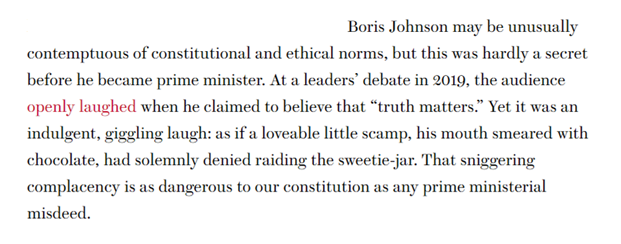
It's often said that Britain relies on a "good chaps theory of government": that the British constitution only works if operated by "good chaps", who choose to obey the rules.
I think that's wrong. Here's why.
My latest for @prospect_uk [Excerpts follow] prospectmagazine.co.uk/politics/has-t…
I think that's wrong. Here's why.
My latest for @prospect_uk [Excerpts follow] prospectmagazine.co.uk/politics/has-t…
"Far from trusting politicians to be “good chaps,” British politics was once on a hair-trigger for bad or unconstitutional behaviour". As Lord Acton put it in 1887, “Great men are almost always bad men”. And the presumption of wrongdoing should “increase as the power increases”. 

"The problem today is not that leaders have ceased to be “good chaps,” but that we no longer seem to care when they behave badly". We have lost our sense that "bad chaps" matter: and that it is our responsibility to police their conduct. 

"The problem is less one of “constitutions” than of “constitutionalism”: a reluctance to uphold constitutional norms and punish those who break them". So long as “bad chaps” win elections, too many seem happy to indulge them.
"Bad chaps are a feature, not a bug, of constitutional govt; & the best preservative is a public that is intolerant of abuses of power. It was a lesson that was understood by previous generations, steeped in the dangers of “bad kings” & tyrants. It is one we'd be wise to relearn"
The full article is available here. And fantastically, all @prospect_uk articles are free to access until 13 August! prospectmagazine.co.uk/politics/has-t…
• • •
Missing some Tweet in this thread? You can try to
force a refresh











